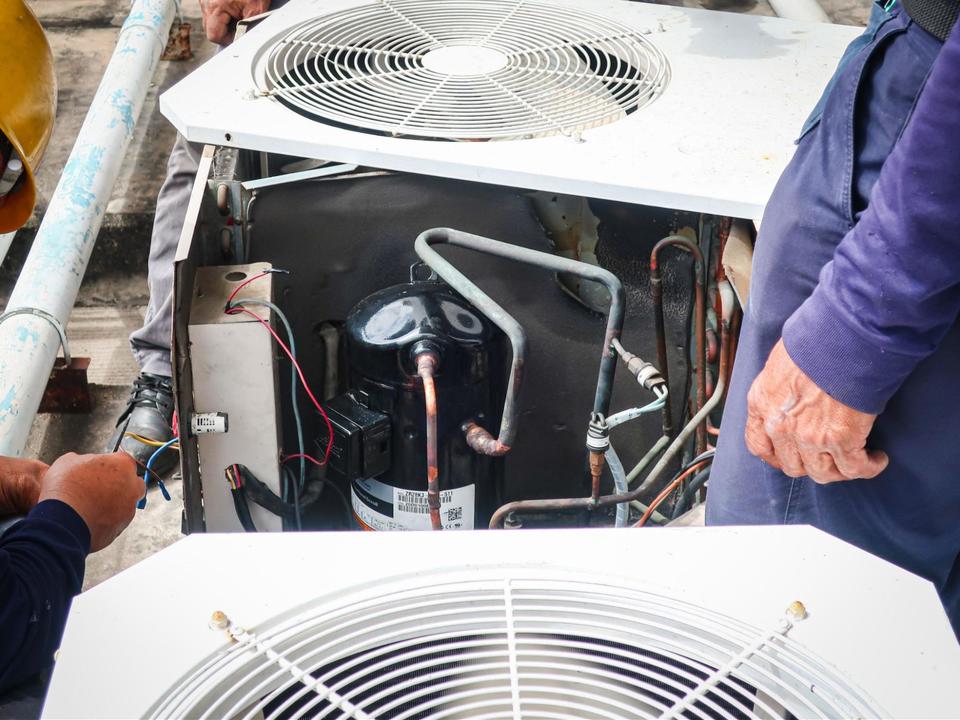The Parts of an AC Unit and How They Work

Are you wondering what's happening inside your air conditioner? It might seem like magic how your AC transforms your home from a sweltering sauna to a cool haven, but only a few key parts are needed to make it work. Understanding these components, like the compressor and air handler, makes diagnosing problems and managing maintenance easy.
We'll look at the most important parts of AC units, covering:
Jump in to learn how your air conditioner keeps your home cool and comfortable.
Understand Your AC — Schedule an Inspection or Repair With Advantage Air
Experiencing AC issues? Whether it's maintenance or emergency repairs, we have you covered with fast service, convenient scheduling, and fair, honest prices. Call Advantage Air today to beat the heat!
What Are the Parts of a Central AC Unit?
All air conditioners have indoor and outdoor units connected by refrigerant lines. This is true whether you have a mini-split or a central AC. However, it's more obvious when looking at a mini-split because the indoor unit will be on a wall or ceiling in the room the system cools.
Parts of a central AC unit don't need to be positioned in the room being cooled, though, since ducts carry the air throughout your home. This means a central AC's indoor unit can be hidden away in a closet, attic, or utility room.
The main parts that make all air conditioners work include:
- Evaporator coil
- Condenser coil
- Compressor
- Expansion valve
- Refrigerant
- Refrigerant lines
- Fans
- Thermostat
- Electrical components
Indoor vs. Outdoor AC Unit Components
On the most basic level, your air conditioner's indoor unit blows cool air into your home and the outdoor unit dumps warmth outside. However, things get a little more complex when looking at the parts of an AC that drive each part of the process.
Indoor Unit
Components of the indoor unit include:
- Evaporator coil: Absorbs heat from your home's air
- Air handler: Circulates cooled air
- Filter: Removes dust, dirt, and allergens
- Thermostat: Regulates temperatures
Outdoor Unit
Parts of an outdoor AC unit include:
- Condenser coil: Releases heat outdoors
- Compressor: Regulates refrigerant pressure and movement
- Condenser fan: Transfers heat away by drawing air over the condenser coil
- Electrical components: Power the system
Piping connects both units, allowing the refrigerant to move through the entire system.
How Each Component Helps Cool Your Home
Air conditioners work by actively removing heat from the air in your home. This is possible thanks to the refrigeration cycle.
The process begins with the evaporator coil in the indoor unit absorbing heat from your home's air, which is then transferred into the refrigerant. The refrigerant then changes from a liquid to a gas and moves to the outdoor unit's compressor. True to its name, the compressor compresses the refrigerant into a high-pressure gas.
After being compressed, hot refrigerant moves through the condenser coil, at which point air blowing across this coil removes the heat, blowing it outdoors. Now a liquid again, the refrigerant passes through another component, the expansion valve, dropping in pressure before circulating back to the indoor unit to start the process again.
Common Problems With AC Parts
Some of the most common problems your AC might experience and the parts responsible include:
- Weak airflow: Clogged air filters or a faulty blower motor
- Running AC without cooling: Refrigerant issues or coil problems
- Loud noises: Loose fan blades, worn parts, and failing compressors
- Inconsistent cooling: Thermostat or capacitor issues
- Warm airflow: Refrigerant leaks or dirty coils
- Water leaks: Clogged drain line or damaged drain pan
When to Repair or Replace Faulty Components
Many component issues only require a quick repair before your AC will work again, but some parts, like the compressor, can be expensive to replace. Generally, replacement may be the better choice if a major component failure occurs and your AC is already nearing the end of its lifespan. Our experienced technicians can help you decide on the best course of action.
Call in the Pros From Advantage Air
Advantage Air's 30 years of experience makes us the team you can trust for AC repairs and honest advice. Our highly trained technicians will diagnose your HVAC issues and recommend the best solution.